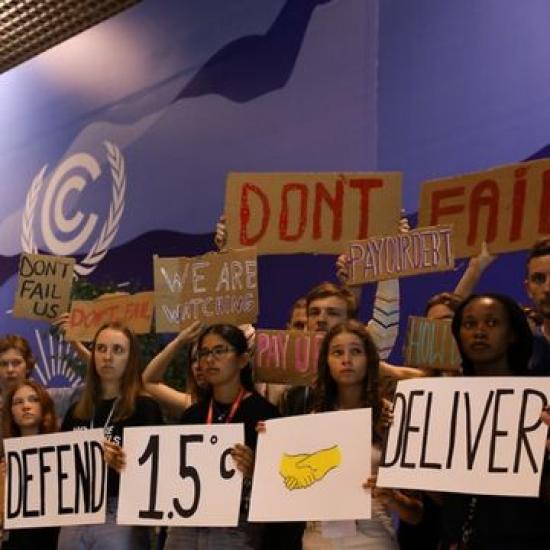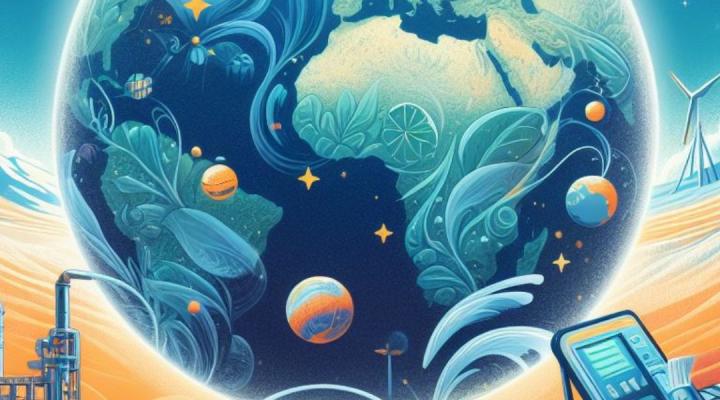How do we build an inclusive and just transition to net zero for all?
Net zero has been a success in terms of focusing attention, allowing for business and policy makers alike to concentrate their climate concerns on seven simple letters. It has emerged clearly amid a quagmire of difficult to grasp science around the threats of climate change and the threats facing governments, communities and organisations taking climate action. Simplicity in complex circumstances can of course be a double-edged sword. While allowing for a readily recognised articulation of a problem, and the reduction of action to meet simplistic carbon-metrics, there is the danger of enabling the abdication of responsibility for competing social and environmental goals.
Researchers at Oxford Net Zero [i] have led the way in offering clarification of the meaning of net zero, defining it as net zero greenhouse gas (GHG) emissions, often short-handed to the particular GHG of carbon dioxide, and linked to a particular date to avoid catastrophic increases in temperatures. After the November 2022 global climate conference (COP27), the hoped-for limit to an increase of 1.5C and net zero by 2050 is looking optimistic to say the least but is still, just, in the frame according to the latest report by the International Panel on Climate Change.

What is clear is that not only are the global impacts of climate change unevenly distributed, but also the transition to net zero entails unequal distribution of costs and benefits for different people and generations. Thus, one of the pressing questions is what is a fair and just pathway to reaching for net zero emissions. Fairness in the pursuit of net zero is framed as a just transition, articulated more broadly by the International Labour Organization [ii] as a fair transition to environmentally sustainable economies and societies. This is achieved by a more equal sharing of the benefits and costs of moves to net zero (distributive justice), by fair processes in arriving at agreements (procedural justice) and especially by the recognition and representation of human dignity and the marginalised (recognition justice).
Moral philosophy has an important role to play in establishing fairness in the transition to net zero for whom, how, where, why, and when.
How to divide up net zero responsibility?
The goal of net zero GHG emissions is undeniably a positive social good, seen as a requirement to avoid limitations on our way of life. But our ways of life are not the same globally, nationally or even locally. For some, the call is to reduce emissions, for others, emissions are currently low, historically the least in African countries for example [iii], and the call is for them to avoid developing in a way which will increase emissions. Understandably, emerging economies and the majority world see economic growth as imperative in order to support development and protect against lack of opportunity and poverty among their people [iv].
Dividing up different responsibilities across regions is a useful way forward in some respects, given that each country, and regions within countries, is distinctive. To make this meaningful, context-sensitive approaches to net zero and climate action are essential. Indeed, all countries have some kind of legislation or policy directive on climate change, and there is rising ambition which will have material impact, such as the US Inflation Reduction Act and European Union Green Deal Industrial Plan.
National regulatory commitments are already variously translated to net zero requirements by individual organisations and businesses. Sectors have different levels of impact, of course, and energy, manufacturing, transportation, and forestry, agriculture and land use are particularly in the frame in terms of carbon emissions. Beyond industry type organisations of different kinds face different challenges. While metrics such as the presence of climate commitments tend to focus on larger organisations, the vast majority of firms are small and medium sized without resources to invest in climate communication, though they are much lauded as potential sources of eco-innovation [v]. Ownership and governance of firms also makes a difference, with family and mutually owned firms having embedded long term viewpoints that allow for the possibility of investment beyond immediate time horizons [vi].Much is made of the role of large firm customers in supply chains and their capacity to influence the climate actions of their global value chains (known as scope 3 emissions) but there is an inherent tension with their short-term horizons and tendency to default to their own drivers of risk mitigation and profit maximisation.
The past as the present: Bringing the future into focus?
Indeed, time is of the essence here. Not only as a horizon for business practice, but in framing climate action and just transition. The desirable future of ‘environmentally sustainable economies and societies’ needs further interrogation.

What exactly would such a future look like? What version of justice is being prioritised and how is intergenerational justice accounted for? What opportunities might the ideal future bring? Which peoples are at risk of alienation? Who holds the power in decision-making and ideally collective negotiation about net zero? What does a just transition look like within organisations, supply chains, industries, regions and economies. Have nations avoided investing in stranded assets related to fossil fuels [vii], to avoid a future which repeats the dependencies of the past? Which metrics are relied upon to measure net zero progress, and what do they make visible and obscure?
Is the contemporary education system, from early years to higher education, training and retraining, equipping people for the future, or is it reiterating the present or even the past ideals of education? This notwithstanding the efforts for United Nations Principles of Management Education and others to promote climate change teaching to future leaders. In short, there are more questions than answers, and these should not be over-simplified, but addressed from all angles.
Social, economic and environmental justice should converge in the long-term, but that will not happen by chance. Decisions and investments need to be made now which bring the future into focus rather than reinforcing the choices of yester year.
What can be done?
Communities, businesses and governments must create and enact the systemic change that is necessary to support climate change mitigation and adaptation. To avoid catastrophe, we need to attend to the role of different people, places and organisations and the implications for them in a just transition to a future that needs more clearly to be defined. We put forward three proposals that address this in the hope that it can provide a just pathway for future discussions:
- Improving institutions and inclusion in global engagement with climate change
- Taking the future and the voice of future generations more seriously
- Raising the focus beyond large corporations to better understand small and medium sized enterprises and other kinds of market actors
First, we need to ensure that this discussion takes into account different global perspectives and that the supporting institutions needed to achieve this are enabled. To date, the majority of the discourse around climate change has taken place at Framework Convention on Climate Change summits and within Western international organisations, primarily under the auspices of the UN. The views of those who are less able to finance large delegations to these events need to be heard more clearly. Understanding the perspective of those who are not in a position to divert resources from poverty alleviation and economic growth such as emerging nations need to be at the forefront of debate, supported by strong, enabling institutions. Just and fair pathways to net zero are undermined without full, enabled engagement.
Second, we need more intergenerational involvement and recognition of the future that we are creating. Greta Thunberg, among many other young activists, has shown just how powerful the next generation voice can be in calls for immediate action on climate change. These speakers tend to get more attention than the important content of their message when critical decisions are made. It is their voice which needs to be raised, especially when considering the nature of the world to which we are transitioning, that they will inherit. Without their voices, we rest our understanding too much on the past. This needs to change.
And third, we need to break out of the proxy for ‘business’ being a handful of the largest, global north, publicly traded companies. There are many other kinds of organisations to take into account, not least small and medium sized enterprises - which according to the World Economic Forum [viii], represent 90% of all businesses and are responsible for close to 70% of jobs and GDP globally - without their engagement, it is not possible for there to be carbon neutrality by 2050. SMEs are also often family businesses, or include different kinds of ownership structures – sole traders, partnerships, mutuals. Gathering the views from such a diverse and vibrant group of small and medium sized enterprises and other types of firm is a challenge, but associations are in place with the remit to do precisely this, including for example collectives, individual industry associations, and country-level associations such as the Federation for Small Business and the Confederation of British Industry in the UK. Their voices need to be raised in the climate change discussions to enable a more balanced approach.
There will be opportunities and threats in seeking to include a wider, more representative set of voices as we together plan the actions that will guide our environmental and social future. But these voices must be heard if we are to secure a just and fair transition.
Acknowledgements
This piece was informed by the speakers and participants at Just Transition and Net Zero: People, Organisations and Places, an event hosted at Saїd Business School on March 13 2023. We are grateful for their insights, in particular those of the speakers: Lourdes Casanova, Sam Fankhauser, Tina Fawcett, Jonathan Michie, Mette Morsing, Jessica Omukuti, and Jonatan Pinkse.
References
[I] Fankhauser, S., Smith, S.M., Allen, M., Axelsson, K., Hale, T., Hepburn, C., Kendall, J.M., Khosla, R., Lezaun, J., Mitchell-Larson, E., Obersteiner, M., Rajamani, L., Rickaby, R., Seddon, N., & Wetzer, T. (2022) The meaning of net zero and how to get it right. Nature Climate Change 12, 15–21 https://doi.org/10.1038/s41558-021-01245-w
[ii] ILO (International Labour Organization) (2015). Guidelines for a just transition towards environmentally sustainable economies and societies for all. Geneva, Switzerland. https://www.ilo.org/wcmsp5/groups/public/@ed_emp/@emp_ent/documents/publication/wcms_432859.pdf
[iii] Omukuti, J. (2022) Net zero commitments by businesses in Africa: a stocktake. Oxford Net Zero Policy Brief. https://netzeroclimate.org/wp-content/uploads/2022/11/NZ-Businesses-Africa-report-Nov22.pdf
[iv] Casanova, L.; Miroux, A. 2022. Emerging Markets Report 2022: Reinventing Global Value Chains. 4 November 2022. ISBN-13: 978-1-7328042-6-5. ISSN 2689-0127. eCommons Cornell University. Emerging Markets Institute. Cornell S.C. Johnson College of Business. https://hdl.handle.net/1813/112770 DOI https://doi.org/10.7298/9j27-ng36
[v] Hampton, S., & Fawcett, T. (2017). Challenges of designing and delivering effective SME energy policy. European Council for an Energy Efficient Economy Summer Study 2017.
[vi] Michie, J. (2022). Forms of Ownership for Sustainability and Resilience: The Need for Biodiversity and Corporate Diversity. In: Arestis, P., Sawyer, M. (eds) Economic Policies for Sustainability and Resilience. International Papers in Political Economy. Palgrave Macmillan, Cham. pp.91-133.
[vii] Andres, P., Mealy, P., Handler, N., & Fankhauser, S. (2023). Stranded nations? Transition risks and opportunities towards a clean economy. Environmental Research Letters. DOI 10.1088/1748-9326/acc347
[viii] World Economic Forum (2022) Future Readiness of SMEs and Mid-Sized Companies: A Year On, Insight Report. https://www3.weforum.org/docs/WEF_Future_Readiness_of_SMEs_and_Mid_Sized_Companies_A_Year_On_2022.pdf
Photo credits
The climate countdown clock and the civil society action photos are courtesy of UN Climate Change / Kiara Worth






